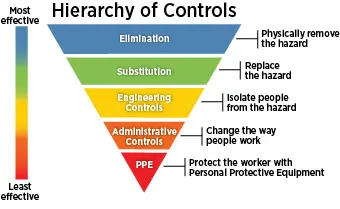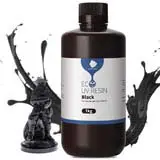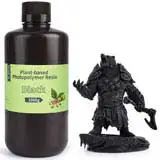Plant-based resin is a UV-curable liquid used in MSLA, DLP, and SLA additive manufacturing. Typically, these resins contain half epoxidized soybean oil and half normal resin chemicals. Since these resins still contain harmful pre-polymers and photoinitiators, you should treat them no different than normal resin.
Companies that manufacture plate-based resin have made arguably misleading statements about this resin type. Some of the claims associated with the plant-based resins are: "made from soybean oil", "truly eco-friendly", "no VOCs", "no BPA", and "no harmful chemicals". However, a product precaution states "wear a mask and gloves to avoid direct skin contact and maintain indoor ventilation."
Quick Facts About All Resin:
- SLA resin is detrimental to the environment and should be regarded as toxic waste
- Waste resin and polluted IPA should never be poured down a drain
- SLA resin will kill marine life
- All resin should be used with proper PPE, ventilation, and filtration
Chemicals in Anycubic's Plant-Based Resin
Nearly 45% of Anycubic's plant-based resin consists of epoxidized soybean oil, which is progress since the only concern with that ingredient is skin sensitization. However, the other 55% consists of input chemicals that are toxic to your body and marine life.
| Chemical Ingredients in Anycubic Plant-Based Resin | ||
| Chemical | Potential Use | Warnings and Dangers |
| Epoxidized soybean oil | plasticizer | Skin Irritant |
| Isooctyl acrylate | pre-polymer | Respiratory Toxicity Aquatic Hazard Skin Irritant Eye Irritant |
| Ditrimethylolpropane tetraacrylate | Respiratory Toxicity Aquatic Hazard Skin Irritant Eye Irritant | |
| 1,1’-(Methylene-di-4,1-phenylene)bis[2-hydroxy-2-methyl-1-propanone] | photoinitiator | Organ Toxicity Aquatic Hazard |
| Polychloro copper phthalocyanine |
pigment | |
Chemicals in Elegoo's Plant-Based Resin
Elegoo's plant-based resin consists of 50% "Epoxy Resins", which we can assume is a combination that includes epoxidized soybean oil. The remaining chemicals still have an inherent risk.
| Chemical Ingredients in Elegoo Plant-Based Resin | ||
| Chemical | Potential Use | Warnings and Dangers |
| "Epoxy Resins" | plasticizer | Skin Irritant |
| 1,6-Hexanediol diacrylate |
binder | Skin Irritant Eye Irritant |
| N-(Dimethylcarbamoyl)glycine |
Skin Irritant Eye Irritant Organ Toxicity | |
| hydroxycyclohexyl phenyl ketone |
photoinitiator | Not Classified |
Claims Made by Anycubic or Elegoo for Plant-Based Resin
The first claim made in reference to the plant-based resin is that it is made from soybean oil. This is largely true since nearly 50% of the resin is made from epoxidized soybean oil, which is chemically altered but not far removed from the plant product.
The second claim is that the resin is "truly eco-friendly". If the resin was made entirely of ingredients not determinantal to human and marine life this would be true, but only 50% of the resin components could be regarded as environmentally safe. This claim is false.
The third claim is that plant-based resin emits no VOCs. Studies have shown that the resin printing releases formaldehyde during printing, cleaning, and curing. A few consumers have confirmed this with plant-based resin as well. Professional tests for air quality are expensive, and any testing performed with most commercially available sensors are not able to detect every type of VOC. This claim is largely false.
BPA is a pre-polymer to epoxy resins and plastics that is known to cause reproductive issues and is anticipated to increase cancer risk. While it may be true that BPA is not present in the resin, the substitution of BPA for BPB, BPF, or BPS does not eliminate the health risk that these chemicals pose to ourselves and the environment.
The fifth claim of "no harmful chemicals" is disingenuous, with even the company's SDS and statement of "wear a mask and gloves to avoid direct skin contact and maintain indoor ventilation" contradicting the claim. This claim is false.
The plant-based resin, from a safety perspective, does not advance significantly from the typical UV-activated resins that can harm ourselves and the environment. That being said, it is worth noting that nearly 50% of this resin was able to utilize a plasticizer/filler that is plant-based. Further research is needed to find a commercial formula that is suitable from both the quality and safety perspectives.
Is There a Non-Toxic Resin?
There are biomedical resins used in surgery and dental work, but even these caused abnormalities or death in animal studies while fully cured. However, when compared to other resins and epoxies, biomedical resins are the safest by far. The downside is that biomedical resin can be expensive.
Food-safe certified epoxy coatings are generally only rated for incidental and short-term contact. These epoxies should not be used for long-term food storage or hot liquids that would exacerbate the leeching of chemicals from the epoxy.
Therefore, biomedical and certified food-safe coatings could be considered non-toxic when used correctly. There is currently not a consumer non-toxic or food-safe resin for 3D printing.
Take Action

https://www.cdc.gov/niosh/topics/hierarchy/default.html

Sources
- CANEC1916332501
- CANEC1917010301
- 10.1080/15376516.2019.1652873
- 10.1016/j.chemosphere.2019.03.177
- https://aksci.com/sds/8291AC_SDS.pdf
- https://www.sigmaaldrich.com/US/en/sds/aldrich/412333
- https://www.sigmaaldrich.com/US/en/sds/aldrich/437425
- https://pubchem.ncbi.nlm.nih.gov/compound/Isooctyl-acrylate#section=Safety-and-Hazards
- https://www.sigmaaldrich.com/US/en/sds/aldrich/408360
- https://pubchem.ncbi.nlm.nih.gov/compound/Ditrimethylolpropane-tetraacrylate#section=Safety-and-Hazards
- https://www.combi-blocks.com/msds/HB-5837.pdf
- https://pubchem.ncbi.nlm.nih.gov/compound/22019754#section=Safety-and-Hazards
- https://pubchem.ncbi.nlm.nih.gov/compound/1_6-Hexanediol-diacrylate#section=Safety-and-Hazards
Disclaimer: You assume all responsibility and risk for the use of, but not limited to, the resources, advice, and opinions of 4D Filtration or its employees. 4D Filtration or its employees do not assume any liability or create any warranty for the use of any information. 4D Filtration may receive commissions for referral links. Prices are approximated for simplicity and they may fluctuate due to sales or markdowns. Amazon .com should refer you to your local amazon site if you are not in the United States; there is a chance Amazon's link redirect system will take you to a different product.


